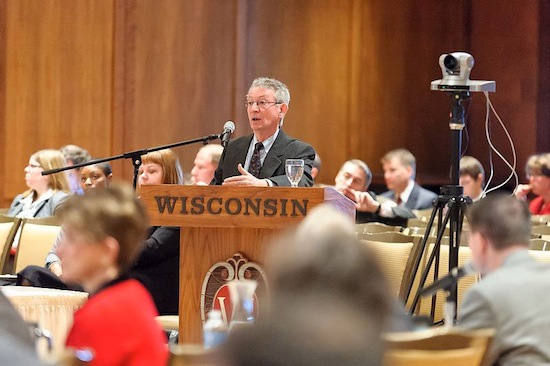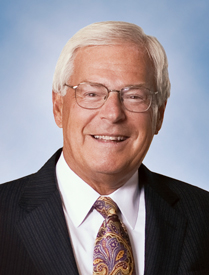Regents alter enrollment guidelines, approve HR plan

Interim Chancellor David Ward addresses the Board of Regents during its meeting last week at Union South.
Photo: Bryce Richter
The University of Wisconsin System Board of Regents made an important change to nonresident enrollment guidelines and cleared the way for implementation of UW–Madison’s HR Design strategic plan.
The regents unanimously approved changes to a section of the UW System Freshman Admissions Policy on Friday that increase the cap on nonresident undergraduate enrollment from 25 percent to no more than 27.5 percent, based on a rolling three-year average.
The policy change was prompted by an unanticipated and increased number of nonresident freshmen choosing to enroll at UW–Madison in fall 2012, which contributed to a 25.8 percent nonresident enrollment. This is the first year since merger that UW–Madison has exceeded the limitation of 25 percent nonresident students.
Minnesota reciprocity students are excluded from the limitation on nonresident undergraduates.
Regent Regina Millner noted that as part of the new standard, UW–Madison — the only UW System institution currently affected by the new cap — would create 200 more freshman spots for Wisconsin students. Increased revenues from out-of-state tuition would fund that larger class, she said.
“The UW System exists first and foremost for the benefit of Wisconsin residents,” said Regent John Drew. “I think it is a good thing we have a cap on nonresident enrollment. It is, in some ways, a guard against the tendency to maximize revenue, and tries to balance the needs of our in-state students.”
“Many admission decisions are occurring right now. Lines in the sand are not particularly useful policy instruments. They tie your hands.”
Interim Chancellor David Ward
As part of its enrollment management plan, UW–Madison will develop and implement a multiyear plan that will guarantee at least 3,500 enrollments per year for Wisconsin resident students in each fall new-freshman class. The policy revision also represents a modest attempt to generate additional revenue and ease policy restrictions to help strengthen the university’s commitment to educational access and quality.
Since the number of Wisconsin high school graduates is declining and will continue to decline over the next several years, the proposal to commit to enrolling 3,500 Wisconsin resident new freshmen by admitting 200 more Wisconsin residents represents an enrollment of a higher fraction of the high school class than in recent years, and a higher number than the average of the past several years.
All other sections of the policy remain unchanged. Minnesota reciprocity students are in a separate category and are not counted as residents or nonresidents.
On Thursday, Interim Chancellor David Ward spoke of the urgency to increase the limit.
“Many admission decisions are occurring right now,” Ward said. “Lines in the sand are not particularly useful policy instruments. They tie your hands.”
UW–Madison is alone among Big Ten institutions in having a policy that formally limits nonresident enrollment.
The regents also accepted a handful of policy and statutory changes to clear the way for the implementation of the campus’s HR Design project.
“We are gratified that the Board of Regents has accepted the UW–Madison HR Design Strategic Plan,” said Bob Lavigna, UW–Madison human resources director and the leader of the project. “In the coming months, we will work closely with campus governance and other stakeholder groups to develop policies and procedures to implement the HR Design framework.”
The board unanimously approved resolutions establishing governance rights for the new university staff employee category, a code of ethics, and a host of technical statutory changes. A resolution giving the Board of Regents administrative authority over UW–Madison employees passed, though two voted in dissent.
The approvals also impact the UW System’s separate proposal, called the University Personnel System.

Whitburn
Regent Gerald Whitburn, chair of the Business, Finance and Audit Committee, praised the work done by both UW–Madison and the UW System, noting that for the first time the Board of Regents will have autonomy over the UW workforce.
Regents Drew and Tony Evers opposed the resolution granting the regents authority over employees.
Drew raised objections to policies regarding compensation, grievance procedures and seniority protection. Drew acknowledged the engagement efforts that have been undertaken through the process to develop the plans, but said they are not a substitute for collective bargaining. He urged the administration to continue to work with stakeholders on implementation.
Chad Goldberg, a professor of sociology and a Faculty Senate alternate, told the regents that recent revisions to the plan have improved it. But he said he does not support it because he feels it erodes employee rights and protections.
Regent approval follows positive votes by campus governance and stakeholder groups, including the Academic Staff Assembly, Faculty Senate, Associated Students of Madison and the Council for Non-Represented Classified Staff.
In other action, the regents:
— Unanimously approved adjustments to the salary range of the position of UW–Madison chancellor.
The range approved by the board, which will take effect on July 1, 2013, is between $427,500 and $522,500. The current range is $369,907 to $452,109 and was set in 2008.
Whitburn said in the next year the committee will evaluate the salary ranges for all UW System chancellor positions and recommend adjustments. He also said the regents should develop a policy regarding university foundation participation in chancellor compensation.
— Approved modified business guidelines for the operation of the Fluno Center for Executive Education.
–By Käri Knutson and Greg Bump




